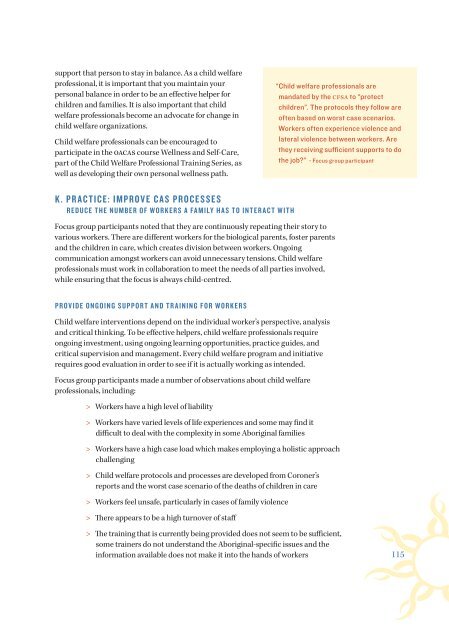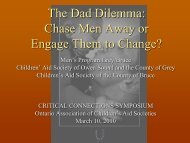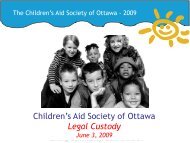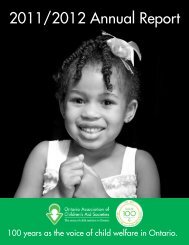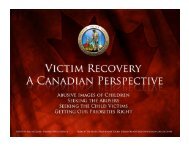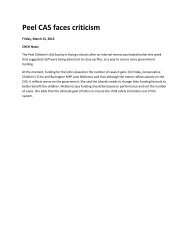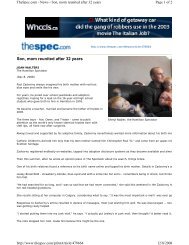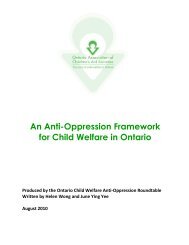English - Ontario Association of Children's Aid Societies
English - Ontario Association of Children's Aid Societies
English - Ontario Association of Children's Aid Societies
You also want an ePaper? Increase the reach of your titles
YUMPU automatically turns print PDFs into web optimized ePapers that Google loves.
support that person to stay in balance. As a child welfare<br />
pr<strong>of</strong>essional, it is important that you maintain your<br />
personal balance in order to be an effective helper for<br />
children and families. It is also important that child<br />
welfare pr<strong>of</strong>essionals become an advocate for change in<br />
child welfare organizations.<br />
Child welfare pr<strong>of</strong>essionals can be encouraged to<br />
participate in the OACAS course Wellness and Self-Care,<br />
part <strong>of</strong> the Child Welfare Pr<strong>of</strong>essional Training Series, as<br />
well as developing their own personal wellness path.<br />
“Child welfare pr<strong>of</strong>essionals are<br />
mandated by the CFSA to “protect<br />
children”. The protocols they follow are<br />
<strong>of</strong>ten based on worst case scenarios.<br />
Workers <strong>of</strong>ten experience violence and<br />
lateral violence between workers. Are<br />
they receiving sufficient supports to do<br />
the job” - Focus group participant<br />
K. PRACTICE: IMPROVE CAS PROCESSES<br />
REDUCE THE NUMBER OF WORKERS A FAMILY HAS TO INTERACT WITH<br />
Focus group participants noted that they are continuously repeating their story to<br />
various workers. There are different workers for the biological parents, foster parents<br />
and the children in care, which creates division between workers. Ongoing<br />
communication amongst workers can avoid unnecessary tensions. Child welfare<br />
pr<strong>of</strong>essionals must work in collaboration to meet the needs <strong>of</strong> all parties involved,<br />
while ensuring that the focus is always child-centred.<br />
PROVIDE ONGOING SUPPORT AND TRAINING FOR WORKERS<br />
Child welfare interventions depend on the individual worker’s perspective, analysis<br />
and critical thinking. To be effective helpers, child welfare pr<strong>of</strong>essionals require<br />
ongoing investment, using ongoing learning opportunities, practice guides, and<br />
critical supervision and management. Every child welfare program and initiative<br />
requires good evaluation in order to see if it is actually working as intended.<br />
Focus group participants made a number <strong>of</strong> observations about child welfare<br />
pr<strong>of</strong>essionals, including:<br />
> > Workers have a high level <strong>of</strong> liability<br />
> > Workers have varied levels <strong>of</strong> life experiences and some may find it<br />
difficult to deal with the complexity in some Aboriginal families<br />
> > Workers have a high case load which makes employing a holistic approach<br />
challenging<br />
> > Child welfare protocols and processes are developed from Coroner’s<br />
reports and the worst case scenario <strong>of</strong> the deaths <strong>of</strong> children in care<br />
> > Workers feel unsafe, particularly in cases <strong>of</strong> family violence<br />
> > There appears to be a high turnover <strong>of</strong> staff<br />
> > The training that is currently being provided does not seem to be sufficient,<br />
some trainers do not understand the Aboriginal-specific issues and the<br />
information available does not make it into the hands <strong>of</strong> workers<br />
115


